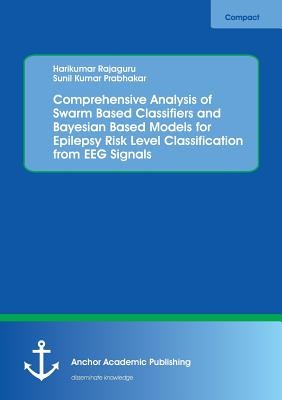
- We will send in 10–14 business days.
- Author: Harikumar Rajaguru
- Publisher: Anchor Academic Publishing
- ISBN-10: 3960671229
- ISBN-13: 9783960671220
- Format: 14.8 x 21 x 0.3 cm, minkšti viršeliai
- Language: English
- SAVE -10% with code: EXTRA
Comprehensive Analysis of Swarm Based Classifiers and Bayesian Based Models for Epilepsy Risk Level Classification from EEG Signals (e-book) (used book) | bookbook.eu
Reviews
Description
This project presents the performance analysis of Particle swarm optimization (PSO), hybrid PSO and Bayesian classifier to calculate the epileptic risk level from electroencephalogram (EEG) inputs. PSO is an optimization technique which is initialized with a population of random solutions and searches for optima by updating generations. PSO is initialized with a group of random particles (solutions) and then searches for optima by updating generations. Hybrid PSO differs from ordinary PSO by calculating inertia weight to avoid the local minima problem. Bayesian classifier works on the principle of Bayes' rule in which it is the probability based theorem. The results of PSO, hybrid PSO and Bayesian classifier are calculated and their performance is analyzed using performance index, quality value, cost function and classification rate in calculating the epileptic risk level from EEG.
EXTRA 10 % discount with code: EXTRA
The promotion ends in 21d.01:46:01
The discount code is valid when purchasing from 10 €. Discounts do not stack.
- Author: Harikumar Rajaguru
- Publisher: Anchor Academic Publishing
- ISBN-10: 3960671229
- ISBN-13: 9783960671220
- Format: 14.8 x 21 x 0.3 cm, minkšti viršeliai
- Language: English English
This project presents the performance analysis of Particle swarm optimization (PSO), hybrid PSO and Bayesian classifier to calculate the epileptic risk level from electroencephalogram (EEG) inputs. PSO is an optimization technique which is initialized with a population of random solutions and searches for optima by updating generations. PSO is initialized with a group of random particles (solutions) and then searches for optima by updating generations. Hybrid PSO differs from ordinary PSO by calculating inertia weight to avoid the local minima problem. Bayesian classifier works on the principle of Bayes' rule in which it is the probability based theorem. The results of PSO, hybrid PSO and Bayesian classifier are calculated and their performance is analyzed using performance index, quality value, cost function and classification rate in calculating the epileptic risk level from EEG.


Reviews